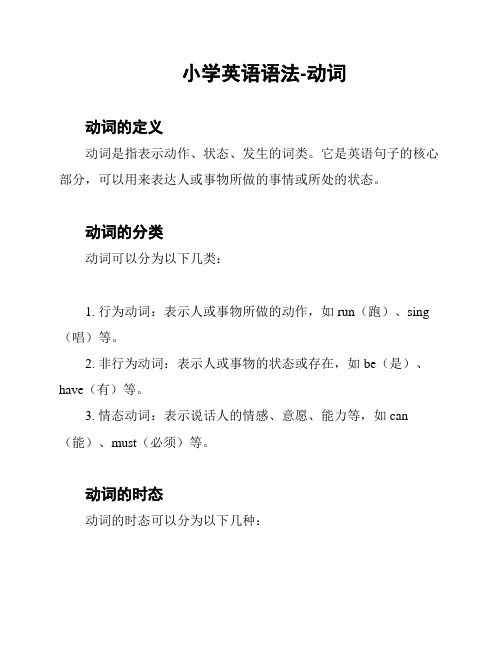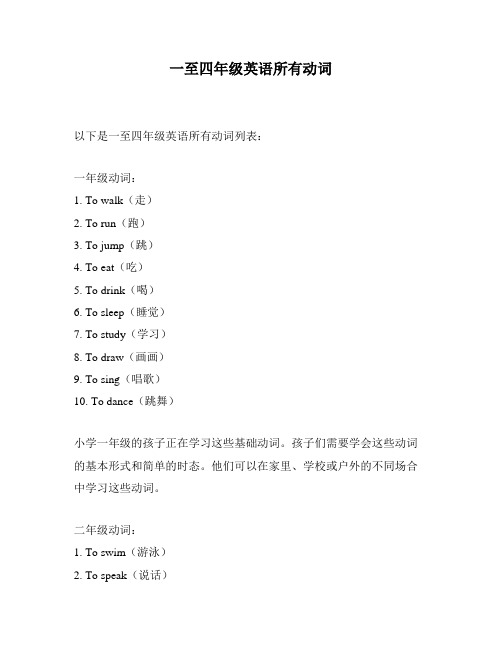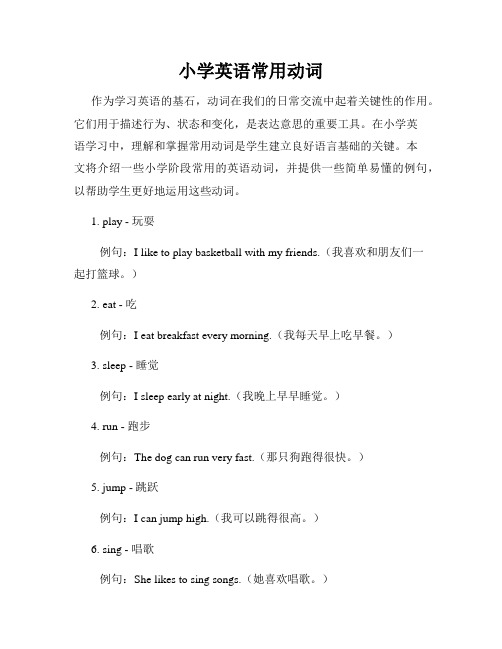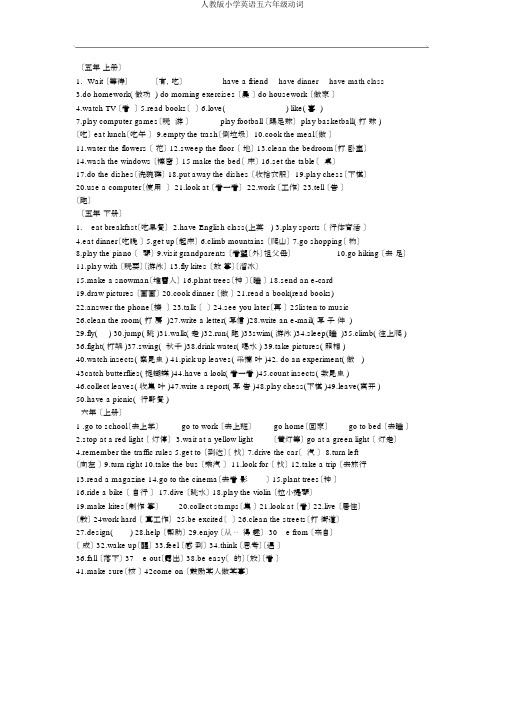小学英语动词
小学英语语法-动词

小学英语语法-动词动词的定义动词是指表示动作、状态、发生的词类。
它是英语句子的核心部分,可以用来表达人或事物所做的事情或所处的状态。
动词的分类动词可以分为以下几类:1. 行为动词:表示人或事物所做的动作,如run(跑)、sing (唱)等。
2. 非行为动词:表示人或事物的状态或存在,如be(是)、have(有)等。
3. 情态动词:表示说话人的情感、意愿、能力等,如can (能)、must(必须)等。
动词的时态动词的时态可以分为以下几种:1. 现在时:表示目前正在进行的动作或常规的动作,如play (玩)、eat(吃)等。
2. 过去时:表示过去发生的动作或状态,如ran(跑过)、ate (吃过)等。
3. 将来时:表示将来将要发生的动作或状态,如will play(将要玩)、will eat(将要吃)等。
动词的变化形式动词在不同的时态中会有不同的变化形式,如:1. 现在时的第三人称单数形式:在现在时中,当主语是第三人称单数(he、she、it)时,动词要加上-s或-es。
例如:She plays football(她踢足球)。
2. 过去式的变化形式:在过去时中,一般情况下,动词要加上-ed或-d。
例如:They played together yesterday(昨天他们一起玩)。
3. 现在分词和过去分词的形式:现在分词一般以-ing结尾,过去分词一般以-ed结尾。
例如:He is swimming in the pool(他正在游泳)。
以上是关于小学英语动词的基本知识,希望能对您有所帮助。
参考资料:。
一至四年级英语所有动词

一至四年级英语所有动词以下是一至四年级英语所有动词列表:一年级动词:1. To walk(走)2. To run(跑)3. To jump(跳)4. To eat(吃)5. To drink(喝)6. To sleep(睡觉)7. To study(学习)8. To draw(画画)9. To sing(唱歌)10. To dance(跳舞)小学一年级的孩子正在学习这些基础动词。
孩子们需要学会这些动词的基本形式和简单的时态。
他们可以在家里、学校或户外的不同场合中学习这些动词。
二年级动词:1. To swim(游泳)2. To speak(说话)3. To read(阅读)4. To write(写作)5. To climb(爬山)6. To ride(骑自行车)7. To fly(飞)8. To play(玩耍)9. To watch(观看)10. To listen(听)小学二年级的孩子正逐渐建立起对动词的基本理解。
这些动词与日常生活紧密相关,并提供了更多的机会来学习不同的时态和用法。
三年级动词:1. To speak(说话)2. To listen(听)3. To write(写作)4. To sing(唱歌)5. To dance(跳舞)6. To play(玩耍)7. To study(学习)8. To swim(游泳)9. To run(跑)10. To walk(走)小学三年级的孩子已掌握了基础动词和时态。
这些动词强调了日常活动,并提供了更多的机会来学习不同的用法和意义,以及如何适当地运用这些动词。
四年级动词:1. To ask(问)2. To answer(回答)3. To explain(解释)4. To plant(种植)5. To cook(烹饪)6. To clean(打扫)7. To fix(修理)8. To pick(采摘)9. To help(帮助)10. To play(玩耍)小学四年级的孩子已经学习了许多基础动词和用法,现在需要学习更多复杂的动词和固定短语。
小学英语动词短语

小学英语动词短语(一)动词短语:1、go to school 去上学2、go home回家3、go swimming去游泳4、go to bed上床睡觉5、watch TV看电视6、wash clothes洗衣服7、do housework做家务8、do the dishes洗碗碟9、do homework 做家庭作业10、play basketball打篮球11、play chess下象棋12、play baseball打棒球13、play football踢足球14、play volleyball打排球15、play computer games玩电脑游戏16、play table tennis打乒乓球 17、play the piano弹钢琴18、play the guitar弹吉它19、play the drum打鼓20、play the flute吹笛子21、play the violin拉小提琴22、play the trumpet吹小号 23、have a picnic去野餐24、have breakfast吃早餐25、have lunch吃午餐26、have dinner/supper吃晚餐 27、have a good time玩得愉快28、have English class上英语课29、get up起床 30、take pictures照相31、draw a picture画画32、listen to music听音乐33、do morning exercises做早操34、collect stamps集邮35、fly kites放风筝36、open the door打开门37、speak English说英语38、get on上(车) 39、get off下(车)小学英语动词短语(二)40、stand up起立41、sit down坐下42、have a look看一看43、look at看…… 44、turn on the light打开灯45、turn off the light关灯46、sweep the floor扫地47、do sports做运动48、clean the window擦窗户49、clean the blackboard擦黑板50、come on来吧 51、make friends交朋友52、laugh at嘲笑 53、come back回来54、read books读书55、see the doctor看医生 56、come from来自……57、be from来自……58、water the flowers浇花59、make the bed铺床60、climb mountain爬山61、go to work上班62、have a try试一试 63、go shopping去购物64、go hiking去远足 65、play with……玩……66、wake up醒来67、make a snowman堆雪人 68、send emails发电子邮件69、plant trees种树70、cook dinner做晚饭71、talk to…… 和某人谈话72、climb trees爬树73、read newspaper看报纸74、drink water喝水 75、write a letter写一封信76、live in China住在中国 77、go to see films去看电影78、turn left向左转79、turn right向右转 80、go with us和我们一起去81、ride a bike骑自行车82、read stories看故事书83、help your mum帮妈妈84、eat fast food吃快餐。
小学英语常见动词短语总结

小学英语常见动词短语总结在小学英语学习过程中,动词短语(verb phrases)是非常重要的一部分,它们可以帮助我们描述动作和状态,使我们的语言更加流利和生动。
本文将为大家总结一些常见的小学英语动词短语,希望能为学习者提供一些帮助。
1. Wake up: 意为“醒来”,指从睡眠中醒来的动作。
例句:I wake up at 7 o'clock every morning.翻译:我每天早上7点醒来。
2. Get dressed: 意为“穿衣服”,表示穿衣的动作。
例句:Please get dressed before going out.翻译:出门前请穿好衣服。
3. Brush teeth: 意为“刷牙”,表示刷牙的动作。
例句:Remember to brush your teeth after meals.翻译:吃完饭后记得刷牙。
4. Go to school: 意为“去上学”,表示去学校的动作。
例句:I usually go to school by bus.翻译:我通常坐公交车去上学。
5. Have breakfast/lunch/dinner: 分别表示“吃早餐/午餐/晚餐”。
例句:I have breakfast at 7:30 every day.翻译:我每天7点半吃早餐。
6. Do homework: 意为“做作业”,表示完成作业的动作。
例句:Don't forget to do your homework tonight.翻译:别忘了今晚做作业。
7. Play sports/games: 分别表示“参加运动/玩游戏”的动作。
例句:We often play soccer on weekends.翻译:我们经常在周末踢足球。
8. Watch TV: 意为“看电视”,表示观看电视的动作。
例句:I like to watch TV before bedtime.翻译:睡觉前我喜欢看电视。
小学英语常用动词

小学英语常用动词作为学习英语的基石,动词在我们的日常交流中起着关键性的作用。
它们用于描述行为、状态和变化,是表达意思的重要工具。
在小学英语学习中,理解和掌握常用动词是学生建立良好语言基础的关键。
本文将介绍一些小学阶段常用的英语动词,并提供一些简单易懂的例句,以帮助学生更好地运用这些动词。
1. play - 玩耍例句:I like to play basketball with my friends.(我喜欢和朋友们一起打篮球。
)2. eat - 吃例句:I eat breakfast every morning.(我每天早上吃早餐。
)3. sleep - 睡觉例句:I sleep early at night.(我晚上早早睡觉。
)4. run - 跑步例句:The dog can run very fast.(那只狗跑得很快。
)5. jump - 跳跃例句:I can jump high.(我可以跳得很高。
)6. sing - 唱歌例句:She likes to sing songs.(她喜欢唱歌。
)7. dance - 跳舞例句:We dance at the party.(我们在派对上跳舞。
)8. read - 读书例句:He likes to read books in the library.(他喜欢在图书馆读书。
)9. write - 写作例句:I write a diary every day.(我每天写日记。
)10. draw - 画画例句:She can draw beautiful pictures.(她可以画出漂亮的图画。
)11. speak - 说话例句:They speak English and Chinese.(他们会说英语和汉语。
)12. listen - 听例句:Please listen carefully to the teacher.(请认真听老师讲。
)13. watch - 观看例句:We watch movies on weekends.(我们在周末看电影。
人教版小学英语五六年级动词

人教版小学英语五六年级动词〔五年上册〕1. Wait 〔等待〕〔有,吃〕have a friend have dinner have math class3.do homework( 做功 ) do morning exercises 〔晨〕 do housework 〔做家〕4.watch TV 〔看〕5.read books〔〕6.love() like( 喜 )7.play computer games〔玩游〕play football 〔踢足球〕 play basketball( 打球 )〔吃〕 eat lunch〔吃午〕 9.empty the trash〔倒垃圾〕 10.cook the meal〔做〕11.water the flowers 〔花〕 12.sweep the floor 〔地〕 13.clean the bedroom〔打卧室〕14.wash the windows 〔檫窗〕 15 make the bed〔床〕 16.set the table〔桌〕17.do the dishes〔洗碗碟〕 18.put away the dishes 〔收拾衣服〕 19.play chess〔下棋〕e a computer〔使用〕 21.look at 〔看一看〕 22.work 〔工作〕 23.tell 〔告〕〔跑〕〔五年下册〕1.eat breakfast〔吃早餐〕2.have English class(上英 )3.play sports 〔行体育活〕4.eat dinner〔吃晚〕5.get up〔起床〕6.climb mountains 〔爬山〕7.go shopping〔物〕8.play the piano 〔琴〕 9.visit grandparents 〔看望〔外〕祖父母〕10.go hiking 〔去足〕11.play with 〔玩耍〕〔游泳〕 13.fly kites 〔放筝〕〔溜冰〕15.make a snowman〔堆雪人〕 16.plant trees〔种〕〔睡〕 18.send an e-card19.draw pictures 〔画画〕 20.cook dinner 〔做〕 21.read a book(read books)22.answer the phone〔接〕 23.talk 〔〕 24.see you later〔再〕 25listen to music26.clean the room( 打房 )27.write a letter( 写信 )28.write an e-mail( 写子件 )29.fly( ) 30.jump( 跳 )31.walk( 走 )32.run( 跑 )33swim( 游泳 )34.sleep(睡 )35.climb( 往上爬 ) 36.fight( 打架 )37.swing( 秋千 )38.drink water( 喝水 ) 39.take pictures( 照相 )40.watch insects(察昆虫 ) 41.pick up leaves( 采摘叶 )42. do an experiment( 做 )43catch butterflies( 捉蝴蝶 )44.have a look( 看一看 )45.count insects( 数昆虫 )46.collect leaves( 收集叶 )47.write a report( 写告 )48.play chess(下棋 )49.leave(离开 )50.have a picnic( 行野餐 )六年〔上册〕1 .go to school〔去上学〕go to work 〔去上班〕go home〔回家〕go to bed 〔去睡〕2.stop at a red light 〔灯停〕3.wait at a yellow light〔黄灯等〕go at a green light〔灯走〕4.remember the traffic rules5.get to 〔到达〕〔找〕 7.drive the car〔汽〕 8.turn left〔向左〕 9.turn right 10.take the bus 〔乘汽〕 11.look for 〔找〕 12.take a trip 〔去旅行13.read a magazine 14.go to the cinema〔去看影〕15.plant trees〔种〕16.ride a bike 〔自行〕 17.dive 〔跳水〕 18.play the violin 〔拉小提琴〕19.make kites〔制作筝〕20.collect stamps〔集〕 21.look at 〔看〕 22.live 〔居住〕〔教〕 24work hard 〔真工作〕 25.be excited〔〕 26.clean the streets〔打街道〕27.design() 28.help 〔帮助〕 29.enjoy 〔从⋯得趣〕 30 e from 〔来自〕〔成〕 32.wake up〔醒〕 33.feel 〔感到〕 34.think 〔思考〕〔遇〕36.fall 〔落下〕 37 e out〔露出〕 38.be easy〔的〕〔放〕〔看〕41.make sure〔核〕 42come on 〔鼓励某人做某事〕。
小学英语动词类词汇
小学英语动词类词汇动词(V.)1、play玩;踢2、swim游泳3、skate滑冰4、fly飞5、jump跳6、walk走7、run跑8、climb爬9、fight 打架10、swing荡11、12、eat 吃13、sleep 睡觉14、like像;喜欢15、have 有;吃16、turn 转弯17、buy 买18、take 买;带19、live居住20、teach教21、go去22、study 学习23、learn 学习24、sing 唱歌25、dance 跳舞26、row 划27、do homework 做作业28、watch TV 看电视29、read books 读书30、cook dinner/ the meals 做饭31、water the flowers 浇花32、sweep the floor扫地33、clean the bedroom/room打扫卧室/房间34、make the bed 铺床35、set the table 摆饭桌36、wash the clothes 洗衣服37、do the dishes洗碗碟38、use a computer 使用计算机39、do morning exercise 晨练;做广播操40、eat/have breakfast 吃早饭41、eat/have dinner 吃晚饭42、go to school 上学43、have English class 上英语课44、play sports 进行体育活动45、get up 起床46、climb mountains 爬山47、go shopping 买东西48、play the piano 弹钢琴49、visit grandparents 看望(外)祖父母50、go hiking 去远足51、fly kites 放风筝52、make a snowman 堆雪人52、plant trees 种树54、draw pictures 画画55、answer the phone 接电话56、listen to music 听音乐57、write a letter写信58、write an e-mail 写电子邮件59、drink water 喝水60、take pictures 照相61、watch insects观察昆虫62、pick up leaves 采摘树叶63、do an experiment 做实验64、catch butterflies 捉蝴蝶65 count insects 数昆虫66、collect insect 收集昆虫67、collect leaves 收集树叶68、write a report 写报告69、play chess 下棋70、have a picnic 举行野餐71、get to 到达72、ride a bike 骑自行车73、play the violin 拉小提琴74、mak kites 制作风筝75、collect stamps 收集邮票76、meet 见面77、welcome 欢迎78、thank 谢谢79、love爱80、work 工作81、drink 喝82、taste 尝83、smell 闻84、feed 喂养85、shear 剪86、milk 挤奶87、look 看88、guess 猜89、help 帮助90、pass 传递91、show 展示use使用clean打扫open 打开close 关上put 放read 读92、write 写93、paint 绘画94、tell 告诉95、kick 踢96、bounce 反弹97、ride 骑98、stop 停99、wait 等100、find 寻找101、drive 驾驶102、fold 折103、send 寄104、wash 洗105、shine 106、照耀107、become 108、变成108、feel 感觉到109、think 思考110、meet 遇见111、fall 落下112、leave 离开113、wake up 醒来114、put on 穿上115、take off 脱掉116、hang up 挂起117、wear 穿118、go home 回家119、go to bed 上床睡觉120、play computer games 玩电脑游戏121、play chess 下棋123、do housework 做家务124、empty the trash 倒垃圾125、put away the clothes 收拾衣服126、get off 下车127、take a trip 去旅行128、read a magazine 阅读杂志129、go to the cinema 去看电影。
小学英语课本动词表
小学英语课本动词表动词列表以下是小学英语课本常用的动词列表:1. eat - 吃2. drink - 喝3. sleep - 睡觉4. run - 跑5. walk - 走6. play - 玩7. study - 研究8. read - 读9. write - 写10. listen - 听11. speak - 说12. sing - 唱13. dance - 跳舞14. swim - 游泳15. draw - 画16. paint - 涂色17. watch - 看18. clap - 鼓掌19. jump - 跳跃20. cook - 烹饪用法示例以下是一些动词的用法示例:- I eat an apple every day.(我每天吃一个苹果。
)- They drink water after playing sports.(他们运动后喝水。
)- She sleeps early every night.(她每天晚上早睡。
)- The children run in the park.(孩子们在公园里跑。
)- We walk to school every morning.(我们每天早晨步行去上学。
)- Let's play soccer in the field.(让我们在场地上踢足球。
)- He studies English in the library.(他在图书馆研究英语。
)- I read a book before bedtime.(睡觉前我读一本书。
)- She writes a letter to her friend.(她给朋友写信。
)- Listen to the teacher carefully.(认真听老师讲。
)- Can you speak English?(你会说英语吗?)- Sing a song for us.(给我们唱一首歌。
)- Let's dance together at the party.(在派对上一起跳舞吧。
小学生应该掌握的英语动词
小学生应该掌握的英语动词accept vt 承认;接受;答应afford vt.负担得起(……的费用)抽得出(时间);提供agree v 同意;应允allow vt.允许;准许appear vi出现;显得;好像arrive vi到达;达到ask v①问②请求;要求become v变得;成为begin v开始;着手believe v相信;信任blow v吹;刮风;吹气borrow v(向别人)借;借用breathe vi.呼吸, 发出bring vt 带来;拿来build v 建筑;造burn v燃烧buy vt购买carry vt①运送;搬运②携带catch v①接住②捉住③赶上(车辆)④患(传染病等)celebrate vt庆祝.choose vt 挑选;选举climb v爬,攀登collect vt收集;搜集;聚集come vi来;来到connect vt连接;把……联系起来count vt 计数;计算decide v决定;下决心describe vt描写;叙述develop vt.发展;开发die v死dig v挖(洞,沟等);掘discover vt发现;发觉discuss vt讨论divide vt.分;划分encourage vt.鼓励enter vt.进去;进入examine vt.检查;诊察excite vt.使兴奋;使激动expect vt.盼望explain vt解释;说明express vt.表达, 表示draw v①画;绘制②拉;拖drive v驾驶;驱赶eat v吃enjoy vt欣赏;享有fail v失败;不及格fall vi ①落下;下降②倒下;跌倒feed vt喂(养);饲(养)feel v﹠link 感觉;摸;触fetch vt 拿来;取来;带来fill vt满;充满find vt找到;发现;发觉;感到finish v结束;做完fix vt修理;安装follow vt 跟随;(表示时间、次序等)接着forget v忘记;忘掉freeze vi.结冰get vt ①得到;收到②(用于have got 短语中)具有③到达give vt给;递给;给予;付出go vi ①去;走;驶②通到;达到grow v ①生长;发育②种植③渐渐变得guess vi猜hang v①悬;挂②绞死;吊死happen vi发生have vt有;吃;喝;进行;经受hear v①听见②听说;得知hide v隐藏;把……藏起来hold vt ①拿;抱;握住②举行;进行hurt vt伤害;伤痛imagine vt.想象;设想improve vt.改进;更新include vt包括introduce vt介绍invent vt发明;创造invite vt邀请join v①连接②参加;假如jump v跳;跳跃keep v ①保持;保存②保持(某种状态)kill v 杀死;弄死know v懂得;了解;知道;认识lay vt放;搁;下(蛋)learn vt①学习②听说;获悉leave v ①离开②把……留下;剩下lend vt把……借给;借出let vt让lie v①躺;卧②平放listen vi仔细听;倾听litter v乱丢杂物live vi ①居住②活着;生存③生活lose vt丢失;丧失make vt①做;制造②使得marry v结婚mater vt精通,掌握mean vt意思是;意味着meet vt碰见;遇见mend v修理miss vt①想念;惦记②错过;未看见move v移动;搬动;搬家pass vt①经过;路过②传递③通过pick v拾起;采集please v ①请②使人高兴;使人满意practice v练习;实践produce v.制造;生产pronounce vt发音protect vt.保护provide vt.提供put vt放;摆raise ①举起;抬起②提高;增加reach v到达;抵达read v读;朗读receive v收到;得到recite v背诵refuse vi拒绝relax v(使)放松,轻松remember v 记得;想起return v①回来②归来;送回rise vi①上升;升起②起床;起立run vi跑;奔跑rush vi 冲;奔save vt救;挽救say vt说;讲see vt ①看;瞧②理解;领会③拜访;会见;看望seem v 似乎,好像sell v 卖;售send v①打发;派遣②送;寄出serve vt.招待(顾客等);服务share vt.分享;共同使用shine v①照耀;发光;发亮v②使发光;使发亮shut 关闭;关门;禁闭skate vi.滑冰spell vt 拼写sing v 唱;唱歌sit vi坐speak v①说话;讲话②讲;说(某种语言)spend v①花费②度过start v①开始;着手②出发steal vt.偷窃succeed vi.成功suggest vt.建议;提议suppose vt.猜想;假定sweep v扫;扫除swim vi 游泳take vt①拿;取②拿走;带走;带去③做(和名词连用);表示与该名词意义相关的动作④花费(时间)⑤吃;喝;服用⑥乘车(船)teach v教;教书tell vt①告诉②讲述③吩咐think v①想;思考②认为③考虑throw v 投;掷;扔treat vt.看待;对待try v试;试图;努力understand v 明白;理解;懂得wait vi等;等待wake v醒;醒来want vt ①要;想要②需要;必要wear v穿;戴weigh vt重(若干)win v获胜;赢得warn vt.警告,预先通知write v①书写;写下②写信③写作;著述。
一至六年级常用的英语动词
一至六年级的英语动词一至六年级的英语动词有be动词、情态动词、助动词、行为动词。
一、be动词(am,is,are,was,were )1、amwas,is was,are--were口诀:我用am,你用are,is用在他她它,所有复数全用are。
2、肯定和否定句I am (not) from London. He is(not) a teacher. She is(not) in the dining room. My hair is(not) long. Her eyes are(not) small.3、一般疑问句Am I a Chinese? Yes,you are. No,you arent. Are they American? Yes,they are. No,they arent. Is the cat fat? Yes,it is. No,it isnt.4、be动词的否定形式:am not(没有缩写形式),are not = arent,is not = isnt.二、助动词(do,does,did )do,does用于一般现在时,其过去式did用于一般过去时。
它们通常用在疑问句和否定句中。
它们的否定形式:do not = dont,does not = doesnt,did not = didnt.注意:在一般现在时中,does用于第三人称单数,其余一律用助动词do;助动词do,does,did后面一定要用动词原形。
三、情态动词情态动词也是一类特殊的动词,平时我们不把它说成是动词。
情态动词可以和行为动词同时出现在同一个句子中。
我们现在学过的情态动词有:can、could、shall、should、will、would、may、might、must.注意:情态动词后动词总是用原形。
(不受其他任何条件影响)四、行为动词就是平时上课时说的动词,表示某一动作或行为。
如:sweep、live等。
- 1、下载文档前请自行甄别文档内容的完整性,平台不提供额外的编辑、内容补充、找答案等附加服务。
- 2、"仅部分预览"的文档,不可在线预览部分如存在完整性等问题,可反馈申请退款(可完整预览的文档不适用该条件!)。
- 3、如文档侵犯您的权益,请联系客服反馈,我们会尽快为您处理(人工客服工作时间:9:00-18:30)。
小学英语动词、词组、句型汇总归纳
由动词开头构成的短语、词组很多。
复习时应分类处理:
一.动词+介词
1.look at…看…,look like … 看上去像……,look after …照料…
2.listen to…听……
3.welcome to…欢迎到……
4.say hello to …向……问好
5.speak to…对……说话
此类短语相当于及物动词,其后必须带宾语,但宾语无论是名词还是代词,都要放在介词之后。
如:
This is my new bike. Please look it after.(×)
This is my new bike. Please look after it.(√)
二.动词+副词
“动词+副词”所构成的短语义分为两类:
A.动词(vt.)+副词
1. put on 穿上
2.take off脱下
3.write down记下
此类短语可以带宾语,宾语若是名词,放在副词前后皆可;宾语若是人称代词,只能放在副词的前面。
试比较:
First listen to the tape, then write down the answe r/write the answer down. (√)
First listen to the answer, then write down it.(×)
First listen to the answer, then write it down.(√)
B.动词(vi)+副词
e on赶快
2.get up起床
3.go home回家
e in进来
5.sit down坐下
6.stand up起立
此类短语属于不及物动词,不可以带宾语。
三.其它类动词词组
1.close the door
2.1ook the same
3.go to work/class
4.be ill
5.have a look/seat
6.have supper
7.1ook young
8.go shopping
9.watch TV/games 10. play games.
介词短语聚焦
“介词+名词/代词”所构成的短语称为介词短语。
现将Unitsl-16常用的介词短语按用法进行归类。
1.in+语言/颜色/衣帽等,表示使用某种语言或穿着……。
如:in English,in the hat
2.in + Row/ Team/ Class/ Grade等,表示“在……排/队/班级/年级”等。
3.in the morning/ afternoon/ evening/ 表示“在上午/下午/傍晚”等一段时间。
4.in the desk/ pencil-box/bedroom 等表示“在书桌/铅笔盒/卧室里”。
5.in the tree表示“在树上(非树本身所有)”;on the tree表示“在树上(为树本身所有)”。
如:There are some in the tree. There are many apples on the trees.
6.in the wall表示“在墙上(凹陷进去)”;on the wall表示“在墙上(指墙的表面)”。
如:There’re four windows in the wall, and there is a map on the back wall.
7.at work(在工作)/at school(上学)/at home(在家)应注意此类短语中无the。
8.at + 时刻表示钟点。
如:at six, at half , past ten.
9.like this/that表示方式,意为“像……这/那样”。
10.of短语表示所属关系。
如:a picture of a classroom, a map of China.
11.behind/ beside/ near/ under+ 名词等,表示方位、处所。
如:beside/ near the door, under/ behind the tree.
12.from与to多表示方向,前者意为“从……”,后者意为“到……”。
如:from one to ten, (go) to school/ bed/ work.
另外,以下这些短语也必须掌握。
如:on duty, after breakfast, at night, at the door, in the middle, in the sky, on one’s bike等。
重点句型汇总
1.I think…意为“我认为……”,是对某人或某事的看法或态度的一种句型。
其否定式常用I don’t think…,如:I think he’s Mr Zhinag. (L17)I don’t think you are right.
2.gi ve sth. to sb./ give sb. sth.意为“把……给……”,动词give之后可接双宾语,可用这两种句型;若指物的宾语是人称代词时,则只能用give it/ them to sb. 如:
His parents give him a nice purse./His parents give a nice purse to him. Give it to Mr Hu.(L57)
3.take sb./ sth. to…意为“把……(送)带到……”,后常接地点,也可接人。
如:
Please take the new books to the classroom.
4.One…, the other…/One is…and one is…意为“一个是……;另一个是……”,必须是两者中。
如:One is red and one is grey.(L50)或One is red,, the other is grey.
5.Let sb. do sth. 意为“让某人做某事”,人后应用不带to的动词不定式,其否定式为Don’t let sb,do sth.,或Let sb. not do sth. 另外,Let’s 与Let us的含义不完全相同,前者包括听者在内,后者不包括听者在内,如:Let’s go for a walk./Let us try once more, please.
6.help sb. (to) do sth./help sb. with sth.意为“帮助某人做某事”,前者用不定式作宾补,后者用介词短语作宾补,二者可以互换。
如:Let me help you find it.(L42)/Let me help you with it.
7.What about…?/How about…?意为“……怎么样?”是用来询问或征求对方的观点、意见、看法等。
about为介词,其后须接名词、代词或V-ing等形式。
如:What/How playing chess?
8.It’s time to do…/ It’s time for sth. 意为“该做……的时间了”,其中to后须接原形动词,for后可接名词或V-ing形式。
如:It’s time to have supper. =It’s time for supper.
9.l ike to do sth./like doing sth.意为“喜欢做某事”,如:Li Lei and his friends like to play in the tree house. (L 43)前一种句型侧重具体的一次性的动作;后一种句型侧重习惯性的动作,试比较:
Tom likes swimming, but doesn’t like to swim this afternoon.
10.ask sb.(not) to do sth. 意为“让某人(不要)做某事”,其中ask sb.后应接动词不定式,如:
Ask your friends to guess what is in it. (L44)
11.show sb. sth. / show sth. to do.意为“把某物给某人看”,该句型的用法同前面第2点。
如:
Show your friend your family photo.(L36)/Show your family photo to your friend.
12.introduce sb. to sb.意为“把某人介绍给另一人”;introduce to sb.则是“向某人作介绍”。
如:Introduce your family to her.。
